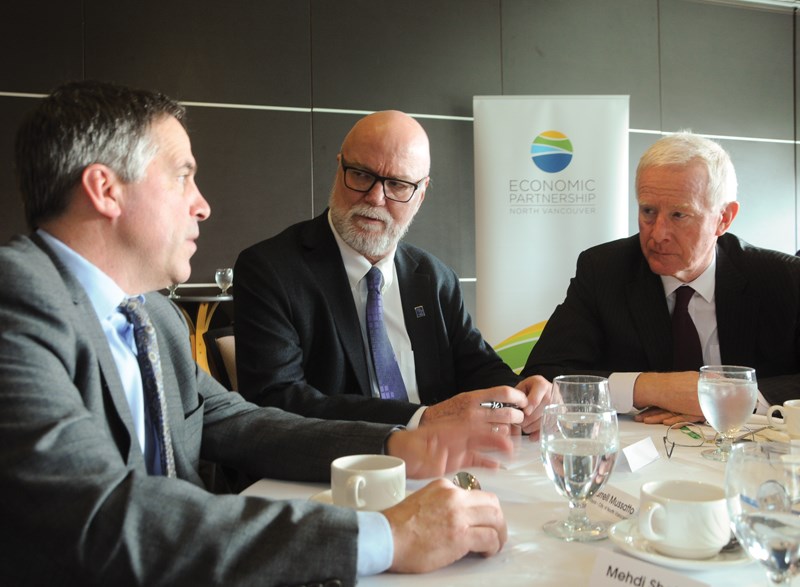The intertwined issues of skyrocketing real estate values and traffic gridlock took centre stage Thursday as North Vancouver mayors answered questions at a lunch with business leaders.
“Traffic is the topic we get accosted with the most,” said District of North Vancouver Mayor Richard Walton, speaking to a capacity crowd hosted by the North Vancouver Chamber of Commerce during a lunch at the Seymour Golf and Country Club.
But Walton added, “It’s not the disease, it’s the symptom.”
North Vancouver City Mayor Darrell Mussatto agreed. Citing a recent B.C. Statistics report that showed the population of the North Shore is actually decreasing, Mussatto said traffic problems aren’t caused by out-of-control housing development, as many people think.
“The population on the North Shore is decreasing and at the same time traffic is out of control,” he said. “Richard and I get blamed.”
Mussatto said he regularly hears from people who tell him, “You’re wrecking my city” by approving development.
But most of the traffic gridlock is caused by people who live off the North Shore and commute here to work in their cars, said both mayors.
“People can’t afford to live here,” said Mussatto. “We need to allow those people to live here. We have to redesign our cities so people don’t have to drive as much.”
Walton pointed out that when the new Port Mann Bridge opened, traffic on the North Shore noticeably worsened. A huge increase in traffic problems “started literally that week,” he said.
Both mayors said adding a third bridge to the North Shore – not anticipated anytime soon – would make the problem worse, not better.
Costs of a third bridge crossing would also be prohibitively expensive, said Walton. “Logistically the cost of land acquisition is staggering,” he said. Such a crossing would likely mean tolls of $10 to $15 each way, he added. “Nobody’s going to pay that.”
Mussatto also criticized the province for projects like the Massey Crossing, announced by the province to replace the Massey Tunnel – which he said are adding to traffic, rather than making it better, and killing the region’s growth plan.
Both mayors called for better public transportation as key to solving traffic woes.
Mussatto added he’s “extremely disappointed” in the small improvements handed out to the North Shore so far by TransLink. Residents will likely have to wait until 2019 to see noticeable transit improvements in more frequent SeaBus service and new B-line buses, he said.
Mussatto also defended the city’s promotion of cycling as an alternative form of transportation. “Cyclists are cars off the road,” he said.
Some people question the city’s decision to build bike lanes, Mussatto acknowledged. “You’d think we were paving the church of Jesus of itself,” he said.
He added that when city crews plowed some bike lanes before plowing the street in the recent cold snap, he got an earful from residents. “That brings stress to the mayor,” he joked.
Both mayors emphasized that more affordable housing is needed on the North Shore so people don’t have to commute from homes far away.
Walton said construction of new housing units is currently happening at a pace below what has been set out in the district’s official community plan.
“We’re going to see a ramping up,” as the municipality catches up, he said.
Mussatto added affordable housing has to address rental stock as well as new strata units for sale. “Renting should also be an option,” he said.
Mussatto pointed to the city’s proposed plan to allow both coach houses and secondary suites on single-family lots as a way of helping. “I’m proud of that,” he said. The proposed change goes to public hearing Feb. 20.



